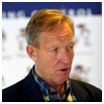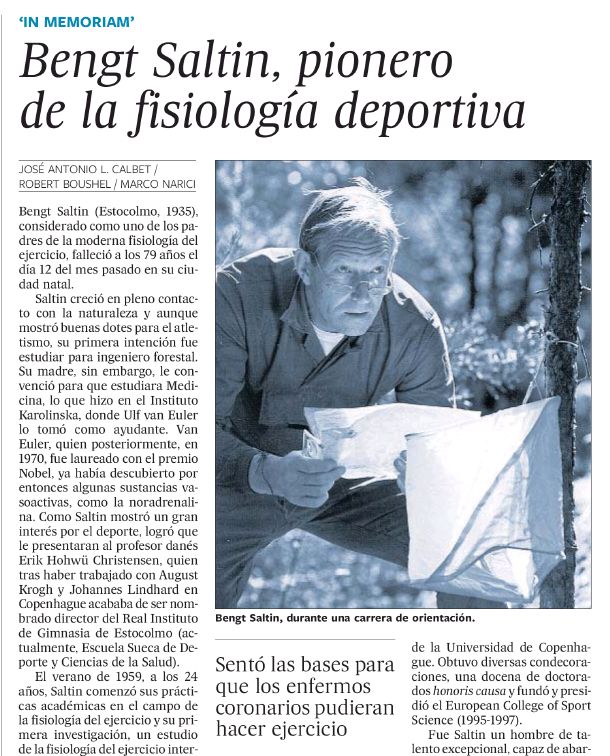ECSS mourns the loss of Prof Bengt Saltin on September 12, 2014The European College of Sport Science is deeply saddened by the recent loss of Professor Bengt Saltin. Professor Saltin was a most distinguished scholar in exercise physiology, a real pioneer and leader in human applied physiology. He was one of the main founders of the ECSS and undoubtedly its ‘spiritual father’, a constant guide and point of reference for the scientific standing of our College. Professor Saltin always understood and promoted exercise science as an inter- and multidisciplinary academic endeavor and leaves an incredibly rich legacy. We shall remember him with the greatest respect and gratitude for his scientific contribution and continued commitment to the ECSS.
The ECSS
Obituary Prof Bengt Saltin
In 1964, Bengt defended his doctorate with Hohwü Christensen and Per-Olof ?strand as mentors and then embarked on a prodigious span of research in the field of exercise physiology in which he was to become a world leader. During the 60’s Bengt was fortunate to work with some of the leading exercise physiologists producing several classical articles, mostly dealing with factors limiting exercise performance and adaptations to training. In the mid-sixties, he worked with Jonas Bergstrom and Erik Hultman starting a new line of research focusing on muscle adaptations to exercise which he pursued during the decades to follow. In the late 60’s his work in Dallas on “Response to exercise after bed rest and after training” had a major impact in both physiology and medicine, and contributed to him being awarded the International Olympic Committee Prize in Sport Sciences in 2002, -the highest recognition a scientist can receive from the international sports world. In 1973 he was appointed professor at the University of Copenhagen where he continued his career first at the August Krogh Institute and later as Director of the Copenhagen Muscle Research Centre (CMRC). At the CMRC several Danish groups with diverse expertise and methodologies made it possible to investigate cardiovascular and muscle physiology from the systemic to the most advanced molecular levels, and the rich research environment Bengt nurtured there brought both international interest and collaboration. Bengt led several field expeditions to the Himalayas, Andes, North Greenland and Kenya, where several aspects of human adaptation to environment were studied. He also led some comparative physiology studies in horses and camels, which became classics in the field. Bengt had a tremendous curiosity about diverse scientific areas, and an enormous capacity for work; he published more than 500 works, mentored many students from around the world and also served a term as Dean of the Faculty of Science while at the University of Copenhagen. He was a Knight of the Dannebrog (Royal Danish Decoration) and was honoured with the Swedish king's gold medal. He was a member of Danish Academy of Sciences, received honorary doctorates from 12 universities, and received numerous honorary awards throughout his life, including Novo Nordisk Prize. Amongst the numerous achievements of his remarkable career, he was the first President of the European College of Sport Science (1995-1997) of which he was one of the founding fathers. He brought to the College his extensive experience and knowledge in exercise physiology and actively promoted the value of an empirical approach to sport science. His strong background in biomedical sciences and close interest in the Arts disciplines were instrumental for developing the ECSS as a strong, multidisciplinary, international scientific organisation. He was an exceptionally talented scientist, capable of covering almost every aspect of exercise physiology. His work contributed significantly to advance the understanding of muscle metabolism, regulation of the circulation and the mechanisms of adaptation to exercise training. When asked about what is the secret of a successful research career, he replied “a good question”. He enjoyed discussions probing hypotheses on physiological mechanisms and he was thrilled by the challenge of seemingly impossible experiments, which he often made real. His scientific contributions in the field of exercise physiology have had a major impact in the field of public health, which he remained devoted to as a physician. Bengt took great interest in literature, history and the arts, and gravitated to nature when he had time. He had an impeccable memory, which combined with his sharp intellect and humble humour made him a fascinating storyteller. Bengt Saltin died peacefully, surrounded by his family in Stockholm. He was 79. He will be deeply missed by those close to him and by many colleagues and students around the world who knew him personally. He was not only a brilliant scientist, he was a truly remarkable human being. Jose A L Calbet, Robert Boushel & Marco Narici
??? Bengt Saltin, pionero de la fisiología
deportiva
Replica Audemars Piguet Royal Oak Offshore
|




